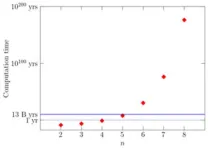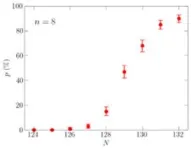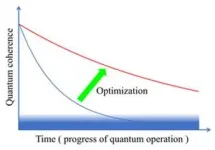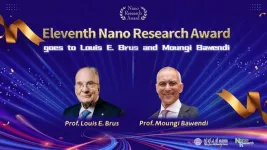(Press-News.org) [Highlights]
- Developed a new compilation method to generate optimal sequences to be executed on quantum computers
- The new method is based on a probabilistic approach and reduces the time to search for the optimal sequence by several orders of magnitude.
- Expected to contribute to quantum information processing at quantum nodes that support the quantum internet
[Abstract]
The National Institute of Information and Communications Technology (NICT, President: TOKUDA Hideyuki, Ph.D.), RIKEN (President: GONOKAMI Makoto, Ph.D.), Tokyo University of Science (President: Dr. ISHIKAWA Masatoshi), and the University of Tokyo (President: FUJII Teruo, Ph.D.) succeeded in developing a technique to quickly search for the optimal quantum gate sequence for a quantum computer using a probabilistic method.
To make a quantum computer perform a task, it must use a compiler to convert instructions written in a programming language into a sequence of gate operations on quantum bits, or qubits for short. We previously applied optimal control theory (GRAPE algorithm) to an exhaustive search to develop a method to identify the theoretically optimal gate sequence, but as the number of qubits increases, the number of possible combinations increases. As the number increases explosively, an exhaustive search becomes impossible. For example, if we were to perform an exhaustive search to find the optimal gate sequence for the task of generating an arbitrary quantum state of 6 qubits, it would take longer than the age of the universe using the fastest classical computer currently available.
Therefore, we attempted to develop a method to search for the optimal quantum gate sequence using a probabilistic approach and succeeded. Using the supercomputer Fugaku, it was confirmed and demonstrated that using a new probabilistic random search method, it is possible to search for the optimal quantum gate sequence for the above problem in a few hours.
This new method is expected to speed up quantum computer compilers, become a useful tool for practical quantum computers, and lead to improved performance of quantum computer devices. It can also be applied to optimize quantum information processing at quantum relay nodes, so it is expected to contribute to the realization of the quantum Internet and the reduction of environmental impact.
This result was published in the American scientific journal Physical Review A on May 6, 2024.
[Background]
Quantum computers, which are currently under development, are expected to have a major impact on society. Their benefits include reducing the environmental burden by reducing energy consumption, finding new chemical substances for medical use, accelerating the search for materials for a cleaner environment, etc. One of the big problems for quantum computers is that the quantum state is very sensitive to noise, so it is difficult to maintain it stably for a long time (maintaining a coherent quantum state).
For best performance, operations must proceed within a time that allows the quantum state to remain coherent. However, apart from the special case where the number of qubits is very small, no good method has been known to find the optimal quantum gate sequence. A solution that avoids the difficulty of the explosive increase in the number of possible gate sequences even in large-scale quantum computations and allows efficient searches within the time and computational resources that can be performed on classical computers has been awaited.
[Achievements]
The research team introduced a probabilistic method to develop a systematic method that can efficiently search for the optimal quantum gate sequence within the execution time and computational resources.
When a computer stores and processes information, all information is converted to a string of bits with values of 0 or 1. A quantum gate sequence is a computer program written in a human-readable language after it has been converted so that it can be processed by a quantum computer. The quantum gate sequence consists of 1-qubit gates and 2-qubit gates. The best sequence is the one with the fewest gates and shows the best performance.
Figure 1 shows the estimated calculation time when a search is performed to optimize the fidelity F on the fastest classical computer for every gate arrangement using the optimal control theory algorithm GRAPE for preparing n qubit states. The solid blue line is the so-called age of the universe (13.7 billion years). As the number of qubits increases, the number of possible combinations increases explosively, so at n=6, the total calculation time exceeds the age of the universe.
Analysis of all possible sequences for small qubit numbers reveals that there are many optimal quantum gate sequences. This suggests the possibility of expanding to large quantum tasks and finding the optimal quantum gate sequence using a probabilistic search method rather than an exhaustive search.
Figure 2 shows the appearance rate (p) of sequences with fidelity F=1 for the preparation of a state consisting of n=8 qubits, which was investigated using the supercomputer Fugaku. The rate p is expressed as a function of the number of 2-qubit CNOT gates (N) in the sequence. It is clear that the probabilistic method is very efficient because the F=1 occurrence rate increases rapidly when the lower limit of N (N=124) is exceeded. For example, the appearance rate of F=1 at N=129, which is a little over N=124, is over 50%, so if you search for a gate arrangement twice, you will find a quantum sequence that has F=1 at least once on average. In this way, it has been found that by using a probabilistic method, it is possible to search for optimal quantum gate sequences several orders of magnitude faster than when searching using an exhaustive search method.
[Future prospects]
The developed systematic and probabilistic method to provide optimal quantum gate sequences for quantum computers is expected to become a useful tool for practical quantum computers and speed up quantum computer compilers. It is expected to improve the performance of quantum computing devices (see Figure 3) and contribute to the development of quantum nodes in the quantum internet and the reduction of environmental burden.
In the future, the research team will integrate the results obtained in this study with machine learning approaches and apply them to optimize the performance of quantum computers, aiming to further speed up quantum compilers and create a database of optimal quantum gate sequences.
END
Developed compiler acceleration technology for quantum computers
Probabilistic method reduces optimal gate sequence search time by orders of magnitude
2024-05-09
ELSE PRESS RELEASES FROM THIS DATE:
Report: Governments falling short on promises of effective biodiversity protection
2024-05-09
WASHINGTON— A new analysis of the world’s largest 100 marine protected areas (MPAs) published today in Conservation Letters suggests that governments are falling short on delivering the promise of effective biodiversity protection due to slow implementation of management strategies and failure to restrict the most impactful activities.
The assessment, titled “Ocean protection quality is lagging behind quantity: Applying a scientific framework to assess real marine protected area progress ...
Study shows how night shift work can raise risk of diabetes, obesity
2024-05-09
Just a few days on a night shift schedule throws off protein rhythms related to blood glucose regulation, energy metabolism and inflammation, processes that can influence the development of chronic metabolic conditions.
The finding, from a study led by scientists at Washington State University and the Pacific Northwest National Laboratory, provides new clues as to why night shift workers are more prone to diabetes, obesity and other metabolic disorders.
“There are processes tied to the master biological clock in our brain that are saying that day ...
Eleventh Nano Research Award goes to Louis E. Brus and Moungi Bawendi
2024-05-09
Recently, Nano Research announced awardees of the 11th Nano Research Award. Two outstanding scientists, Professor Louis E. Brus of Columbia University and Professor Moungi Bawendi of Massachusetts Institute of Technology, have been awarded this honor.
The Nano Research Award, established by the journal Nano Research together with Tsinghua University Press (TUP) and Springer Nature in 2013, aims to recognize outstanding contributions to nano research by an individual scientist. The winner is selected by the Award Committee ...
Traffic injuries to low-income NYC residents fell 30% in first five years of ‘vision zero’ road safety program, NYU study finds
2024-05-09
Among New Yorkers with low incomes, the “Vision Zero” initiative to stem roadway crashes resulted in a marked, 30% reduction in traffic injuries of varying severity from early 2014 – when the city government launched the program – until 2019, according to a new study conducted at New York University.
The study, scheduled for publication May 8 at 4:00 p.m. (ET) in the American Journal of Public Health, revealed this trend of improved safety by comparing Medicaid-covered injury ...
AI tool instantly assesses self-harm risk
2024-05-09
Suicidality hit new record high in U.S. in 2022
New tool was 92% effective at predicting four variables related to self-harm
AI uses a small set of judgment and contextual variables as opposed to big data, and strongly supports the hypothesis of a standard model of mind
EVANSTON, Ill. --- A new assessment tool that leverages powerful artificial intelligence was able to predict whether participants exhibited suicidal thoughts and behaviors using a quick and simple combination of variables.
Developed by researchers at Northwestern University, the University of Cincinnati (UC), Aristotle ...
An epigenome editing toolkit to dissect the mechanisms of gene regulation
2024-05-09
Understanding how genes are regulated at the molecular level is a central challenge in modern biology. This complex mechanism is mainly driven by the interaction between proteins called transcription factors, DNA regulatory regions, and epigenetic modifications – chemical alterations that change chromatin structure. The set of epigenetic modifications of a cell’s genome is referred to as the epigenome.
In a study just published in Nature Genetics, scientists from the Hackett Group at EMBL Rome have developed a modular epigenome editing platform – a system to program epigenetic modifications at any location in the genome. The system allows scientists to study the impact ...
How aging clocks tick
2024-05-09
Aging clocks can measure the biological age of humans with high precision. Biological age can be influenced by environmental factors such as smoking or diet, thus deviating from the chronological age that is calculated using the date of birth. The precision of these aging clocks suggests that the aging process follows a programme. Scientists David Meyer and Professor Dr Björn Schumacher at CECAD, the Cluster of Excellence Cellular Stress Responses in Aging-Associated Diseases of the University of Cologne, have now discovered that aging clocks actually measure the increase in stochastic changes in cells. The study ‘Aging clocks based on accumulating stochastic variation’ ...
miR-146a rs2910164 C>G Polymorphism and Wilms tumor susceptibility in Eastern Chinese children
2024-05-09
Background and objectives
Wilms tumor is the most common renal malignancy in children. miR-146a, a highly conserved small noncoding RNA, plays a critical role in various human diseases. Increasing studies have suggested that rs2910164 C>G polymorphism in miR-146a is associated with susceptibility to cancers. However, miR-146a rs2910164 C>G polymorphism influence on Wilms tumor remains unknown. The aim of this study was to evaluate the relationship between miR-146a rs2910164 C>G polymorphism and Wilms ...
Simple “swish-and-spit” oral rinse could provide early screening for gastric cancer
2024-05-09
BETHESDA, MD. (May 9, 2024) — A simple oral rinse could provide early detection of gastric cancer, the fourth-leading cause of cancer deaths worldwide, according to a study scheduled for presentation at Digestive Disease Week® (DDW) 2024.
“In the cancer world, if you find patients after they've developed cancer, it's a little too late,” said Shruthi Reddy Perati, MD, author and general surgery resident at Rutgers Robert Wood Johnson School of Medicine. “The ideal time to try to prevent ...
Saturated soils could impact survival of young trees planted to address climate change
2024-05-09
The saturated soil conditions predicted to result from increased rainfall in the UK’s upland regions could have a knock-on effect on the ambition to create more woodland in the fight against climate change, a new study has found.
Researchers from the University of Plymouth have spent a number of years exploring how temperate rainforests could be an effective nature-based solution to some of the planet’s greatest challenges.
They have also shown that the UK’s uplands could in future see significantly more annual rainfall than is currently being predicted in national climate models.
In new research, they found that higher soil water levels within areas such ...
LAST 30 PRESS RELEASES:
Asteroid samples offer new insights into conditions when the solar system formed
Fecal transplants from older mice significantly improve ovarian function and fertility in younger mice
Delight for diastereomer production: A novel strategy for organic chemistry
Permafrost is key to carbon storage. That makes northern wildfires even more dangerous
Hairdressers could be a secret weapon in tackling climate change, new research finds
Genetic risk for mental illness is far less disorder-specific than clinicians have assumed, massive Swedish study reveals
A therapeutic target that would curb the spread of coronaviruses has been identified
Modern twist on wildfire management methods found also to have a bonus feature that protects water supplies
AI enables defect-aware prediction of metal 3D-printed part quality
Miniscule fossil discovery reveals fresh clues into the evolution of the earliest-known relative of all primates
World Water Day 2026: Applied Microbiology International to hold Gender Equality and Water webinar
The unprecedented transformation in energy: The Third Energy Revolution toward carbon neutrality
Building on the far side: AI analysis suggests sturdier foundation for future lunar bases
Far-field superresolution imaging via k-space superoscillation
10 Years, 70% shift: Wastewater upgrades quietly transform river microbiomes
Why does chronic back pain make everyday sounds feel harsher? Brain imaging study points to a treatable cause
Video messaging effectiveness depends on quality of streaming experience, research shows
Introducing the “bloom” cycle, or why plants are not stupid
The Lancet Oncology: Breast cancer remains the most common cancer among women worldwide, with annual cases expected to reach over 3.5 million by 2050
Improve education and transitional support for autistic people to prevent death by suicide, say experts
GLP-1 drugs like Ozempic could cut risk of major heart complications after heart attack, study finds
Study finds Earth may have twice as many vertebrate species as previously thought
NYU Langone orthopedic surgeons present latest clinical findings and research at AAOS 2026
New journal highlights how artificial intelligence can help solve global environmental crises
Study identifies three diverging global AI pathways shaping the future of technology and governance
Machine learning advances non targeted detection of environmental pollutants
ACP advises all adults 75 or older get a protein subunit RSV vaccine
New study finds earliest evidence of big land predators hunting plant-eaters
Newer groundwater associated with higher risk of Parkinson’s disease
New study identifies growth hormone receptor as possible target to improve lung cancer treatment
[Press-News.org] Developed compiler acceleration technology for quantum computersProbabilistic method reduces optimal gate sequence search time by orders of magnitude





